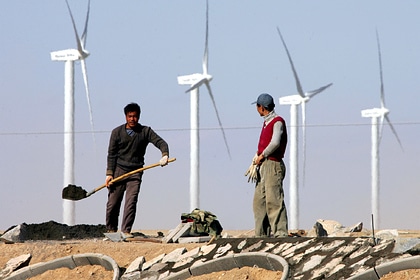The energy crisis in China has hit the country’s economy as electricity rationing has cut domestic production, Reuters reported, citing a survey of economists.
Export growth slowed in September – it increased by 21 percent compared to 2020, but in August it was 25.6 percent. Imports also slowed, rising 20 percent in September from last year, down from 33.1 percent in August. The trade surplus (the difference between exports and imports) declined.
Manufacturing activity in China declined in September due to restrictions on electricity and higher raw material prices. “China’s electricity rationing is likely to continue in the first quarter of 2022 as environmental policy faces fuel and renewable energy shortages,” said Jiang Chang, chief China economist at Barclays. He added that in the winter, energy will be prioritized by households, which will affect the productivity of factories.
Analysts believe the imposition of restrictions on electricity use could increase spending on Chinese exporters, struggling with declining profitability due to supply chain disruptions and rising labor costs.
Increasing electricity shortages in China caused by the country’s shift to clean energy, fast-growing industrial demand and high commodity prices have halted production at many factories. These include major global companies such as Apple and Tesla. Small businesses, caught in a prolonged energy crisis, are forced to close down or use diesel generators, which are more expensive than public electricity supplies. According to a study by Mysteel, due to power shortages in China, production of copper, aluminum and zinc decreased in September, which caused a rise in metal prices.
Chinese regulators said earlier in October that they would loosen safety measures in coal mines and respond “smarter” to accidents amid the energy crisis, Bloomberg writes.
China’s National Development and Reform Commission said in a meeting with miners that accidents will no longer cause nearby mines to be shut down for safety checks. Beijing has decided to sacrifice security in order to increase fuel production, which it intends to expand “at any cost” due to the lack of electricity in the country.
The Chinese coal industry is considered one of the most dangerous in the world. The PRC recently launched a campaign to improve working conditions in mines after two major industrial accidents near Chongqing that killed 39 workers. In 2020, the party increased the number of inspections, and at the beginning of October 2021 tightened penalties for violations of safety requirements in mining. Now those guilty can face heavy fines and even imprisonment.
Such measures frightened producers – companies did not dare to increase production, which led to a weak increase in supply and a sharp rise in the price of coal. The annual growth in coal production in the domestic market from March to August 2021 decreased by 1.5 percent, with an overall increase in electricity production of 8.9 percent. These factors limited the amount of energy produced by coal-fired power plants – their storage facilities quickly emptied as the heating season approached. Some stations closed for maintenance or refused to increase the volume of power generation, as they began to operate at a loss due to the rise in coal prices.
The supply shortage came at very bad times, as global electricity demand has grown at a record pace since the beginning of 2021 as economies recover. China has failed to avoid an energy crisis and now threatens to slow the country’s economic growth and disrupt global supply chains. Energy shortages have already hit the industrial centers in the northeast of the country – in the provinces they were forced to reduce the supply of electricity due to a lack of coal. The cities of Shenyang and Dalian, where more than 13 million people live, were affected. The city of Jilin, with a population of 25 million, is also experiencing problems, where the factories of suppliers of Apple and Tesla are located. There were messages on the network about the disconnection of traffic lights, elevators in residential buildings, installations for 3G mobile coverage. In addition, entire factories began to close. Some shops are candlelit, and utilities say the water supply is on the verge of being cut off.









